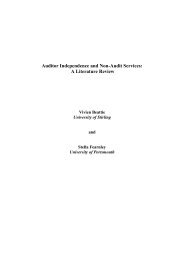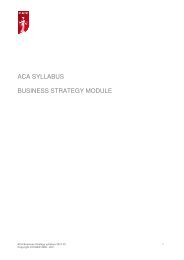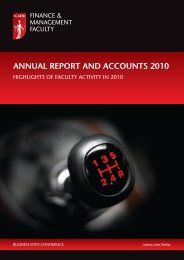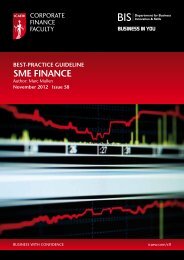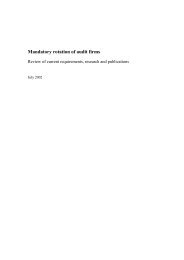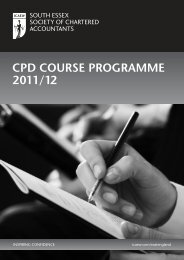8. AGGREGATION AND DECISION8.1 Bases of assessmentThose responsible <strong>for</strong> a <strong>public</strong> <strong>in</strong>terest action need to adopt a process <strong>for</strong> decision mak<strong>in</strong>gwhich can be expla<strong>in</strong>ed and justified. There are frequently a number of alternative outcomes,of which more than one can be justified as be<strong>in</strong>g <strong>in</strong> <strong>the</strong> <strong>public</strong> <strong>in</strong>terest.A number of models to address <strong>the</strong> decision can be used.8.1.1 Decision by rational calculationRational decision-mak<strong>in</strong>g will generally be based on some sort of system of calculation.For example, Bazerman’s six-step approach advocates:• def<strong>in</strong>e <strong>the</strong> problem;• identify criteria and objectives;• weight <strong>the</strong> criteria;• generate alternatives;• rate <strong>the</strong> alternatives on each criterion; and• compute <strong>the</strong> optimal decision to arrive at an expected value <strong>for</strong> each alternative. 172Such <strong>for</strong>ms of decision mak<strong>in</strong>g lend <strong>the</strong>mselves to transparency of process, an importantconsideration <strong>in</strong> terms of justify<strong>in</strong>g use of ‘<strong>the</strong> <strong>public</strong> <strong>in</strong>terest’ and, <strong>in</strong> pr<strong>in</strong>ciple, <strong>the</strong>y avoidemotional override. However, <strong>the</strong>y are often easier set out <strong>in</strong> <strong>the</strong>ory than implemented <strong>in</strong>practice. Consider <strong>the</strong> issues with one calculation approach, utility. Utility is <strong>the</strong> ‘amount’of satisfaction that someone derives from some action, such as <strong>the</strong> consumption of goodsor services.The usage of ‘utility’ <strong>in</strong> relatively modern times is generally credited to Jeremy Bentham.His pr<strong>in</strong>ciple of utility argues that:• <strong>the</strong> best action is <strong>the</strong> one that br<strong>in</strong>gs <strong>the</strong> greatest utility;• <strong>the</strong> greatest utility is what is good; and• good is whatever br<strong>in</strong>gs <strong>the</strong> greatest quantity of happ<strong>in</strong>ess – although he later recognisedthat <strong>the</strong> latter two sometimes conflicted. 173John Stuart Mill took a similar l<strong>in</strong>e but, more concerned with restrict<strong>in</strong>g <strong>the</strong> boundaries ofcentral authority as a pr<strong>in</strong>ciple, he argued that <strong>in</strong>tervention should be restricted to ensur<strong>in</strong>gthat harm to o<strong>the</strong>rs is prevented. 174Ei<strong>the</strong>r way, while utilitarianism is a simple pr<strong>in</strong>ciple, it gives rise to a whole series ofphilosophical and practical questions: What do people want? What authority does or shouldgovernment and o<strong>the</strong>rs have to set policies to achieve greater utility? Do <strong>in</strong>dividuals act <strong>in</strong> away that <strong>the</strong> sum of <strong>in</strong>dividual <strong>in</strong>terests does achieve <strong>the</strong> greatest utility? How do you measureand aggregate <strong>in</strong>dividual utility?Some of <strong>the</strong>se have been considered previously. This part of <strong>the</strong> section addresses a few of<strong>the</strong> practical issues <strong>in</strong>volved <strong>in</strong> determ<strong>in</strong><strong>in</strong>g ‘<strong>the</strong> greatest happ<strong>in</strong>ess’, given a number of optionsto choose from.172Quoted <strong>in</strong> Thagard, How to Make Decisions: Coherence, Emotion and Practical Inference.173Bentham, An Introduction to <strong>the</strong> Pr<strong>in</strong>ciples of Morals and Legislation.174Mill, Utilitarianism.54Aggregation and decision
8.1.2 Decision by <strong>in</strong>tuitionMak<strong>in</strong>g decisions by what seems to us as <strong>in</strong>tuition, has also been called ‘fast th<strong>in</strong>k<strong>in</strong>g’. 175 What isactually happen<strong>in</strong>g is that an automatic sub-conscious mental process has been <strong>in</strong>voked whichrecognises patterns, draws on past experiences and which balances various actions and goals(and prejudices) aga<strong>in</strong>st each o<strong>the</strong>r. Thus many of <strong>the</strong> processes considered <strong>in</strong> <strong>the</strong> Bazermanapproach noted above are be<strong>in</strong>g undertaken, but <strong>in</strong> a less structured and objective manner.Decision mak<strong>in</strong>g by <strong>in</strong>tuition can have some advantages: speed; <strong>in</strong>tr<strong>in</strong>sically tak<strong>in</strong>g <strong>in</strong>to accountwhat we really care about; and a greater <strong>in</strong>centive to implementation. 176 It is also a useful shortcut when common sense can be applied and <strong>the</strong> proposed outcome is not go<strong>in</strong>g to be disputed.There is some empirical evidence suggest<strong>in</strong>g that calculation may sometimes be <strong>in</strong>ferior to<strong>in</strong>tuition <strong>in</strong> mak<strong>in</strong>g good judgements. 177 How often do we do an objective assessment, comeup with a ‘best’ answer and <strong>the</strong>n decide that it is not what we really want to do? This maybe because our objective assessment has caused us to focus too much attention on relativelyunimportant criteria, or because we have subconscious learn<strong>in</strong>g processes that can be<strong>in</strong>terfered with by attempts at explicit learn<strong>in</strong>g.However, decision-mak<strong>in</strong>g by <strong>in</strong>tuition also has drawbacks. It is difficult to switch off and <strong>the</strong>past experiences we are draw<strong>in</strong>g on may not actually match <strong>the</strong> current circumstances. 178O<strong>the</strong>r traits of human nature that lead to illogical decisions are considered later. In particular<strong>the</strong>se <strong>in</strong>clude an over-reliance on emotion (or even crav<strong>in</strong>g) and a lesser likelihood of realis<strong>in</strong>gthat <strong>in</strong><strong>for</strong>mation or alternatives are <strong>in</strong>accurate, irrelevant or miss<strong>in</strong>g. In addition, of particularrelevance to this study, it is difficult to demonstrate how <strong>the</strong> process has been applied and isdifficult to apply <strong>in</strong> group situations, where different members of <strong>the</strong> group arrive at different<strong>in</strong>tuitive outcomes.A comb<strong>in</strong>ation of bases – <strong>in</strong><strong>for</strong>med <strong>in</strong>tuition – is considered below.8.2 Bases of overcom<strong>in</strong>g measurement problems8.2.1 MeasurementThe fundamental pr<strong>in</strong>ciple of measur<strong>in</strong>g utility is that that utility is <strong>the</strong> sum of <strong>in</strong>dividual<strong>in</strong>terests. There<strong>for</strong>e one could set out <strong>for</strong>mulae to calculate utility.Panel 8.1: Utility calculation example(a) <strong>for</strong> an <strong>in</strong>dividualr = a1x1 + a2x2 + a3x3 + ……. +/- anx1x2x3….., where• r is <strong>the</strong> overall measure be<strong>in</strong>g maximised (<strong>for</strong> example wellbe<strong>in</strong>g or happ<strong>in</strong>ess);• x1, x2 etc are <strong>the</strong> satisfactions ga<strong>in</strong>ed from <strong>the</strong> different factors that contribute to <strong>the</strong>overall measure (examples be<strong>in</strong>g economic well-be<strong>in</strong>g, health, or safety);• a1, a2 etc are weight<strong>in</strong>g factors applied to each of <strong>the</strong> satisfactions; and• anx1x2x3 is an <strong>in</strong>teractive factor that allows <strong>for</strong> <strong>the</strong> fact that some comb<strong>in</strong>ations offactors may change overall satisfaction <strong>in</strong> a way that is not just <strong>the</strong> sum of <strong>the</strong> parts.(b) <strong>for</strong> <strong>the</strong> <strong>public</strong> <strong>in</strong>terestR = ∑ Yi/Y ri, where• ri is <strong>the</strong> <strong>in</strong>dividual <strong>in</strong>terest <strong>for</strong> each person be<strong>in</strong>g considered; and• Yi/Y is a weight<strong>in</strong>g factor be<strong>in</strong>g allocated to each of those <strong>in</strong>dividuals. 179Like impact <strong>analysis</strong>, <strong>the</strong> <strong>the</strong>ory beh<strong>in</strong>d measurement <strong>in</strong> this manner is relatively easily set outbut <strong>the</strong> underly<strong>in</strong>g concepts are often difficult to quantify.8.2.2 Ends and meansOn <strong>the</strong> face of it utilitarianism is concerned with <strong>the</strong> outcome, so <strong>in</strong>tent is irrelevant. However,<strong>in</strong> terms of decision mak<strong>in</strong>g, utility will often need to be based on expected outcome, <strong>in</strong>which <strong>in</strong>tent may be relevant. 180175Kahneman, Th<strong>in</strong>k<strong>in</strong>g, Fast and Slow.176Thagard, How to Make Decisions: Coherence, Emotion and Practical Inference.177Quoted <strong>in</strong> Thagard, ibid.178Kahneman, Th<strong>in</strong>k<strong>in</strong>g, Fast and Slow.179Desk<strong>in</strong>s, ‘On <strong>the</strong> Nature of <strong>the</strong> Public Interest’.180Schultz, ‘Henry Sidgwick’.Aggregation and decision55
- Page 1 and 2:
ACTING IN THE PUBLIC INTEREST:A FRA
- Page 3:
ACTING IN THE PUBLIC INTEREST:A FRA
- Page 9: Our framework is based around the k
- Page 12 and 13: The answers to these questions will
- Page 14 and 15: 2. INTRODUCTION2.1 Concepts of the
- Page 16 and 17: Accordingly, this report addresses
- Page 18 and 19: Panel 2.4: ICAEW and its public int
- Page 20 and 21: The Mediterranean republics needed
- Page 22 and 23: We set out a framework for discussi
- Page 24 and 25: 3. CREDENTIALS FOR INVOKINGTHE PUBL
- Page 26 and 27: By and large producers operate in s
- Page 29 and 30: the UK government set up a ‘Commi
- Page 31 and 32: 4. APPLICABILITY OF THE PUBLIC INTE
- Page 33 and 34: to be a public interest matter: fir
- Page 35: This highlights that there may be p
- Page 38 and 39: 5. THE RELEVANT PUBLIC5.1 ScopeIn o
- Page 40 and 41: 5.3 Geographical exclusionsGeograph
- Page 42 and 43: 6. THE RELEVANT PUBLIC’S WANTS6.1
- Page 44 and 45: • work, that is having some, havi
- Page 46 and 47: Panel 6.3: Weisbrod’s public inte
- Page 48 and 49: Having sought out representative op
- Page 50 and 51: 7. CONSTRAINTS TO WANTS7.1 Self-int
- Page 52 and 53: In terms of whether the relevant pu
- Page 54 and 55: Panel 7.5: Management of national d
- Page 56 and 57: Panel 7.6: ICAEW and clarity of val
- Page 60 and 61: Other ethical decision-making model
- Page 62 and 63: In this instance, while national se
- Page 65 and 66: 9. IMPLEMENTATIONA proposed action
- Page 67 and 68: • giving up where targets seem un
- Page 69 and 70: 9.2.1 Government authorityAt the st
- Page 71 and 72: 9.3 Infrastructure and support tool
- Page 73 and 74: 12. The framework proposes a signif
- Page 75 and 76: ibliographyAdler, Jonathan H, Perve
- Page 77 and 78: Goldstein, Eric A, ‘Defining the
- Page 79 and 80: Persky, Joseph, ‘Retrospectives:
- Page 81: The ICAEW is a founder member of th



